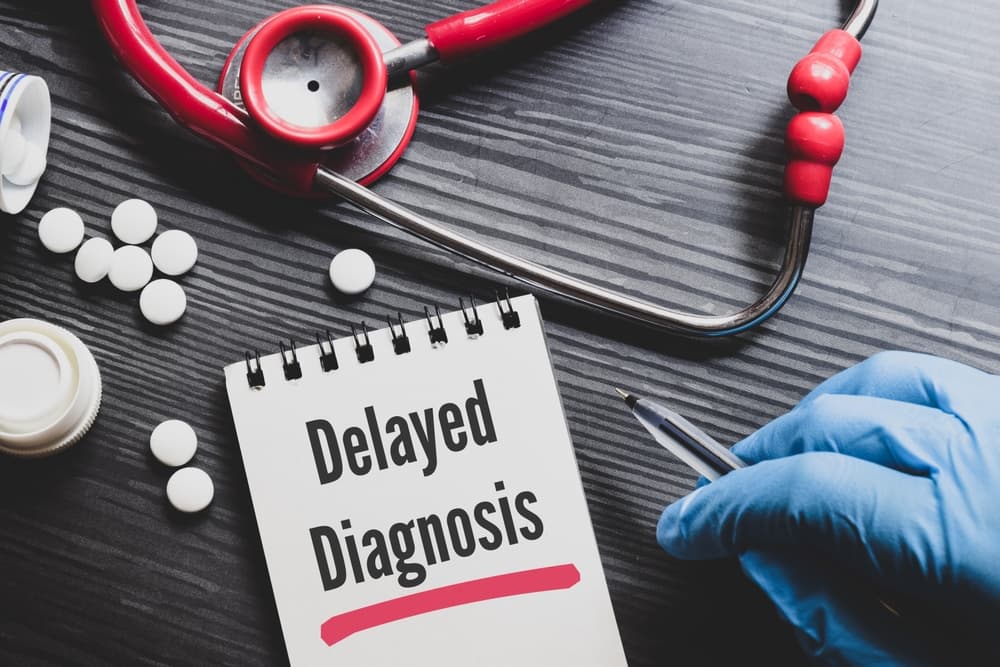Receiving a cancer diagnosis can leave you shocked and frightened. Medical technology advancements allow doctors to treat most early-stage cancers successfully, as catching cancer as early as possible makes the most significant difference in a patient’s prognosis.
That’s why a delayed cancer diagnosis can have devastating consequences for a patient, foreclosing the possibility of effective treatment opportunities. As cancer progresses, a patient’s chances for long-term survival decrease.
A patient who receives a delayed cancer diagnosis due to their doctor’s negligence may have the right to seek compensation for financial and personal losses through a medical malpractice claim.
Because of the complexities of medical malpractice cases, injured patients can improve their chances of recovering compensation by hiring an experienced Bronx medical malpractice attorney.
The Need for Timely Diagnosis of Cancer

The progression of cancer makes timely diagnosis critical to effective treatment.
Cancers progress through four stages:
- Stage 1: Also called early-stage cancer, Stage 1 cancer remains localized to a small area where it initially formed and has not yet spread to other tissues or the lymph nodes.
- Stage 2: Tumors have grown but have not yet spread to other issues.
- Stage 3: The cancer has begun spreading to surrounding tissues and may have entered the lymph nodes.
- Stage 4: Also called metastatic or advanced cancer, Stage 4 cancer means tumors have spread throughout the body.
During the early stages of cancer, doctors have various effective treatment options that cause minimal side effects and have high five-year survival rates.
However, as cancer progresses, a patient’s treatment options become limited. Specific treatments become less effective or entirely ineffective, or patients may need to switch to more intensive treatments like surgery and chemotherapy, which can have significant adverse side effects.
Examples of commonly misdiagnosed cancers include:
- Breast cancer
- Lung cancer
- Colorectal cancer
- Lymphoma
- Melanoma
- Mesothelioma
- Pancreatic cancer
- Ovarian cancer
- Cervical cancer
- Uterine cancer
- Prostate cancer
- Bladder cancer
- Liver cancer
- Thyroid cancer
Vigilant treatment by medical professionals can help catch cancers during early, treatable stages. When patients present with symptoms consistent with cancer, doctors should include cancer in the differential diagnosis and not rule it out until diagnostic testing either conclusively proves that the patient does not have cancer or definitively proves that the patient has another condition.
Doctors should also conduct regular preventative cancer screenings for patients with risk factors for the disease, including age, occupational exposure, family history of cancer, or genetic markers.
Unfortunately, when doctors fail to consider cancer as a potential cause of a patient’s symptoms or monitor at-risk patients for signs of cancer, the disease may go undetected for long enough to progress into a more deadly stage.
Common Causes of Delayed Cancer Diagnoses
Delayed diagnosis or misdiagnosis of cancer can happen for various reasons. Many delayed cancer diagnoses occur due to negligent errors by healthcare professionals. Some of the top causes of cancer misdiagnoses include:
Failure To Include Cancer in the Differential Diagnosis
Doctors may misinterpret a patient’s symptoms or discount the patient’s subjective complaints, leading physicians not to include cancer as a possible diagnosis or prematurely exclude cancer from the differential diagnosis.
Doctors may quickly eliminate cancer as a diagnosis in favor of other more common conditions that mimic cancer symptoms. For example, a doctor might assume that a patient’s digestive issues occur due to conditions like IBS, ulcerative colitis, or Crohn’s disease rather than colorectal cancer.
Failure to Order Diagnostic Testing
Even if doctors consider cancer a potential diagnosis, they may neglect to order diagnostic testing that could exclude or confirm the disease. Many cancers create chemical markers in the blood that can appear in laboratory testing, which may confirm a cancer diagnosis or lead a doctor to order other diagnostic tests like CT scans, MRIs, or PET scans.
Testing Errors
Errors during radiology or laboratory testing may cause healthcare providers to miss signs of cancer, which can lead to diagnostic errors. For instance, doctors can misinterpret data from lab test results, or radiologists reviewing scans may miss abnormalities that can indicate the presence of cancer.
Lack of Follow-Up
Failing to follow up with a patient following diagnosis and treatment may lead to a delayed cancer diagnosis. When a physician diagnoses a patient with a condition and prescribes treatment, the doctor should follow up to confirm that treatment has resolved the patient’s symptoms.
Ongoing or worsening symptoms should alert doctors that they may have made an incorrect diagnosis and should conduct further testing to confirm the diagnosis.
Failure to Consult Specialists or Seek Second Opinions
Some doctors have little experience identifying signs of cancer and may diagnose conditions they are more familiar with rather than consulting a cancer specialist or seeking a second opinion to confirm the diagnosis.
Healthcare System Delays
Unfortunately, delays in the healthcare system, which have become worse in recent years due to the COVID-19 pandemic, may result in patients not receiving timely testing or preventative screenings that can catch signs of cancer at an early stage of the disease.
When Delayed Diagnosis Occurs Due to Medical Malpractice
Not every misdiagnosis or delayed cancer diagnosis occurs due to medical malpractice. Medical malpractice occurs when a healthcare provider renders treatment to a patient that falls outside the accepted standard of care.
The specifics of the standard of care differ from case to case; however, medical professionals generally describe it as making decisions or taking actions that other healthcare providers of similar training and experience would undertake in identical circumstances.
Thus, a doctor might not commit medical malpractice, even if a patient suffers an adverse outcome, if other doctors in the same specialty would have made the same treatment decisions.
Proving that a delayed diagnosis or misdiagnosis of cancer occurred due to medical malpractice requires proving four elements.
First, the victim must establish that the doctor had a physician-patient relationship with them and describe the standard of care applicable in their case.
Next, the victim must explain how the doctor breached the standard of care or how their treatment decisions and actions fell outside the scope of the standard of care. The victim must also prove that their doctor’s substandard care caused them to suffer injuries or harm.
In the context of misdiagnosis or delayed diagnosis of cancer, harm usually results in allowing cancer to progress to a more advanced stage that requires expensive or more painful treatment and decreases a patient’s chances of survival.
A successful medical malpractice claim arising from delayed diagnosis or misdiagnosis of cancer may require various pieces of evidence to explain the standard of care, how your doctor’s treatment failed to meet that standard, and how the substandard care harmed you.
Examples of evidence you might use in your case include:
- Your medical records, including provider notes, radiology scans, and lab test results
- Eyewitness testimony, including statements from other professionals involved in your treatment, such as nurses or physician’s assistants
- Second opinions from other physicians
Most importantly, you will need expert reports and testimony from physicians in the same specialty or subspecialty as your treating physician.
Your medical experts must provide an opinion that describes the specifics of the standard of care in your case, how your doctor’s treatment failed to comply with the standard of care, and how your doctor’s treatment decisions and actions harmed you. The court might dismiss your lawsuit if you do not have expert testimony to support your delayed cancer diagnosis claim.
Financial and Personal Losses Caused by Delayed Diagnosis of Cancer
A delayed diagnosis or misdiagnosis of cancer can cause a person to suffer financial loss and personal harm. A medical malpractice claim may enable a patient whose healthcare providers failed to diagnose their cancer to seek compensation for those losses.
Although no amount of money can compensate for the losses a delayed cancer diagnosis can cause, money can provide a patient with some measure of justice.
Compensation in a delayed diagnosis case can provide financial relief for:
- Costs of treating a more advanced stage of cancer, including more intensive and expensive treatments like chemotherapy or surgery
- Loss of income or future earning capacity when a patient needs to take more time off work to obtain treatment for cancer or if cancer treatment renders the patient unable to work
- Physical pain and suffering from more intensive treatment that have adverse side effects and complications
- Loss of quality/enjoyment of life caused by severe side effects of treatment
- Reduced life expectancy due to cancer reaching a more aggressive stage, decreasing chances of long-term survival
What Steps Should You Take if You Suspect Delayed Diagnosis or Misdiagnosis of Cancer
When you suspect that your healthcare provider may have initially misdiagnosed or failed to diagnose your cancer, you can preserve your legal options for pursuing compensation when you:
- Seek a second opinion from another practitioner as soon as possible, especially if your primary physician has diagnosed you with another condition and prescribed treatment that has not improved your symptoms.
- Obtain copies of your medical records of diagnostic testing and treatment.
- Keep contemporaneous notes of your treatment, including copies of any written correspondence from your medical provider and summaries of doctor’s office or hospital visits, including when visits occurred, the names of people involved in your treatment, diagnostic tests performed, diagnoses made by your doctors, and medications or treatments prescribed.
- Gather your medical bills and invoices or receipts of any expenses related to your medical care and copies of your pay stubs or income statements.
Finally, contact a medical malpractice attorney as soon as possible who can review your case and put you in touch with new medical providers who can assist with your care.
Pursuing a Medical Malpractice Claim for a Delayed Cancer Misdiagnosis
Filing a medical malpractice claim involves unique requirements that other personal injury claims don’t have.
First, a medical malpractice claim must include a certificate of merit. The certificate, signed by a plaintiff or their attorney, must state that the plaintiff or their counsel has consulted with a medical professional who certifies that they have reviewed the plaintiff’s claim and can conclude that the plaintiff has a reasonable basis for filing a medical malpractice lawsuit.
Alternatively, the certificate can state that the plaintiff or their attorney has made good faith attempts to contact at least three medical professionals and that none agreed to provide a consultation.
A patient must file a medical malpractice lawsuit within the state’s applicable statute of limitations.
In New York, the statute of limitations requires a patient to file their lawsuit within 30 months of the date they know or should reasonably know that their medical provider’s negligence caused a cancer misdiagnosis or the date of last treatment during a continuous course of treatment, whichever occurs later.
Because the deadline for filing a delayed cancer diagnosis lawsuit depends on the specific facts of a patient’s case, a patient who believes they have suffered a misdiagnosis should speak with a medical malpractice attorney as soon as possible to determine when to file their claim.
Get Experienced Legal Help to Pursue Financial Recovery and Accountability After Suffering a Delayed Diagnosis of Cancer

A timely cancer diagnosis can significantly affect a patient’s prognosis. Vigilant medical care and preemptive screenings allow doctors to catch cancer early, where patients can receive highly effective treatment with minimal side effects.
On the other hand, a delayed cancer diagnosis allows the disease to progress to stages that are hard to treat and have low long-term survival chances. In many cases, a misdiagnosis or delayed diagnosis of cancer occurs due to negligent errors by healthcare providers.
A patient who suffers a delayed cancer diagnosis due to their doctors’ mistakes may have the right to pursue compensation in a medical malpractice claim. If you suffered a misdiagnosis of your cancer, you need effective, compassionate legal representation to seek the financial relief and justice you deserve.
A knowledgeable personal injury lawyer having experience in medical malpractice cases can help you take legal action to move forward with your life.



